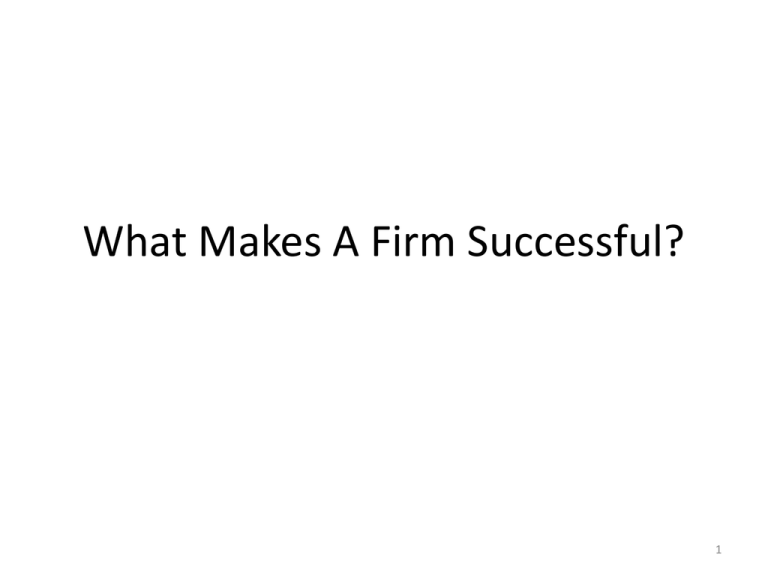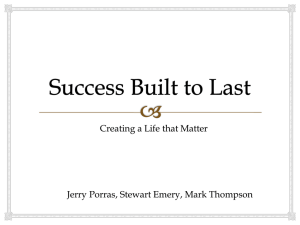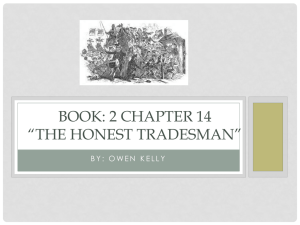What Makes A Firm Successful?
advertisement

What Makes A Firm Successful? 1 What Makes A Firm Successful? • On an average each year 7% of all US firms are new and 1% go under. • Why do some firms succeed and why do some fail? 2 What Makes A Firm Successful? Plain Luck? • Kellogg wheat flakes • Pharmacist Hires’ Herb Tea as non-alcoholic alternative to beer and whiskey for miners“root beer” 3 What Makes A Firm Successful? Quality? According to a study of 450 firms in late 1980s: “ single most important factor in influencing a business unit’s profitability” But Costs can escalate to make it uncompetitive 4 What Makes A Firm Successful? First Mover Advantage? IBM, Coca-cola, Xerox, Kodak, Bayer But First mover takes the risk, others have the lessons One study indicates that on an average the current leaders in 50 markets entered the market 13 years after the first mover! 5 What Makes A Firm Successful? Size/ Market share? • Weak relationship • Profit rate does not rise as fast as market share: Market share of about 10% yields a profit rate of about 10%; market share of about 60% yields a profit rate of about 38%. • Movement away from size: Average size of firms is shrinking since 1970s • Acer in initial years concentrated so much on market share that it went nearly bankrupt- since re-organised into about 20 separate companies 6 What Makes A Firm Successful? M &A or Core Competency? Trend of Mergers since 1990sExxon & Mobil Price club and Costco Wholesale American Airlines and TWA Trend of Acquisitions: Quaker Oats acquired Snapple Sony acquired Columbia Pictures to access latter’s library; HP acquired Compaq in 2002 7 What Makes A Firm Successful? Study by Mercer Management Consulting of New York: In 3 years following transaction, 57% of merged firms lagged behind their industries in terms of returns to shareholders 8 What Makes A Firm Successful? Divesting unrelated business to focus on a single line of business: Some have achieved success by combining the entire production line or “ value chain” in one firm but others have done it differently Nike: Outsourcing production and focusing mainly on marketing 9 What Makes A Firm Successful? Globalisaion? While goods and services may flow more freely among nations than ever before, markets are not homogeneous. McDonald’s- size of outlets, burger meat, sauce… 10 What Makes A Firm Successful? • No single formula for success • No quick fixes • Trade-off: “ There are no free lunches” • Choice 11 BUILT TO LAST James C. Collins and Jerry I. Porras • The authors, James C. Collins and Jerry I. Porras, spent six years in research, and they freely admit that their own preconceptions about business success were devastated by their actual findings--along with the preconceptions of virtually everyone else. • Built to Last identifies 18 "visionary" companies and sets out to determine what's special about them. To get on the list, a company had to be world famous, have a stellar brand image, and be at least 50 years old: Disney, Wal-Mart, Merck. 12 BUILT TO LAST James C. Collins and Jerry I. Porras Twelve myths the Book Talks of: 1. It takes a great idea to start a company - Few visionary companies started with a great idea. Many companies started without any specific ideas (HP and Sony) and others were outright failures (3M). In fact a great idea may lead to road of not being able to adapt. 2. Visionary companies require great and charismatic visionary leaders A charismatic leader in not required and, in fact, can be detrimental to a company's long-term prospects. 13 BUILT TO LAST James C. Collins and Jerry I. Porras 3. The most successful companies exist first and foremost to maximize profits Not true. Profit counts, but is usually not at the top of the list. 14 BUILT TO LAST James C. Collins and Jerry I. Porras 4. Visionary companies share a common subset of "correct" core values They all have core values, but each is unique to a company and its culture. 5. The only constant is change The core values can and often do last more then 100 years. 6. Blue-chip companies play it safe. No, though they appear conservative to outsiders, they take significant risks. 15 BUILT TO LAST James C. Collins and Jerry I. Porras 7. Visionary companies are great places to work, for everyone. No. These companies are only great places to work if you fit the vision, culture and exacting standards. 8. Highly successful companies make some of their best moves by brilliant and complex strategic planning. They actually try a bunch of stuff and keep what works. 9. Companies should hire outside CEOs to stimulate fundamental change Most have had their change agents come from within the system. 16 BUILT TO LAST James C. Collins and Jerry I. Porras 10. The most successful companies focus primarily on beating the competition. They focus on beating themselves. 11. You can't have your cake and eat it too. (Tyranny of OR) Decisions don't have to be ‘either A or B‘ but ‘A AND B” 12. Companies become visionary primarily through "vision statements". Vision is not a statement; it is the way you do business. 17











